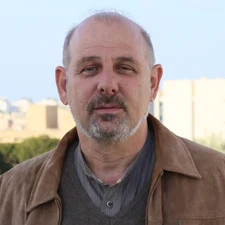Lev V. Eppelbaum

The 2019 Christiaan Huygens Medal is awarded to Lev V. Eppelbaum for outstanding work that has led to significant progress in geology and geophysics, with special emphasis on the development of new methods for the analysis of magnetic, thermal and gravity data.
Lev Eppelbaum was born in 1959 in Georgia. After receiving a MSc Degree in Geophysics from the Azerbaijanian Oil and Gas University and a PhD in Geophysics from the Institute of Geophysics of the Georgian Academy of Sciences and Moscow Mining Academy, he joined the All-Union Geophysical Institute in Baku, Azerbaijan, and subsequently the Tel Aviv University, in Israel, where he currently is an Associate Professor in Geosciences.
Eppelbaum is an internationally highly recognised scientist. His achievements in different areas of geology and geophysics are impressive. He excels in the application of magnetics and gravimetry to the exploration of solid Earth geology, with special attention to the treatment of noise in geoscientific measurements. Magnetics senses variations in the Earth’s magnetic field due to magnetic subsurface rocks, oil and gas deposits, whereas gravimetry measures the density of the underground rock from the surface; Eppelbaum has developed novel algorithms and approaches for the processing and interpretation of data measured by using these geophysical methods in complex environments. He has also made significant contributions to global geodynamics, deep thermal field analysis, and he clarified the role of iron in Earth’s evolution.
Eppelbaum has conceived new methodologies for the advanced interpretation of thermal data in the near-surface as well as in deep boreholes, for the localization of tectonic structural and environmental features and for searching useful minerals. He has optimised the evaluation of thermal history from shallow borehole samples, which allows deducting meaningful information on the evolution of climate on our planet in the past; his developed algorithms can nowadays be considered as standard in this field. Further algorithms that he developed can be used to detect microgravity anomalies and localise hidden sinkholes.
During his scientific career, Eppelbaum has skillfully carried out geophysical inspections in different areas of applications, often combining complementary approaches and performing an integrated analysis of the measured data. The investigations that he carried out in archaeologically interesting regions of the Eastern Mediterranean are particularly noteworthy, as they led to the discovery of new cultural heritage sites. Further studies of considerable importance allowed him to create new three-dimensional physical-geological models of the Earth’s crust in Caucasus and in the European-Arabian-African region. Other remarkable and fruitful investigations aimed at finding economically interesting minerals and at predicting dangerous geodynamic activities.
Currently, Eppelbaum is developing innovative approaches for integrated geophysical surveys with equipment mounted on remote operated vehicles, which is a cutting-edge topic of high practical interest due to the numerous possible applications.
In consideration of the above, Lev Eppelbaum is a most worthy recipient of the EGU Christiaan Huygens Medal.
